Growing up in the coastal town of Pilar, Bataan, these Crispy Crablets (Pritong Maliliit na Alimango) bring back the most cherished memories of my childhood.
Every weekend, I would watch in excitement as local fishermen brought in their fresh catch of tiny crablets, and my Lola would transform them into these incredibly crunchy, golden-brown delights that had everyone in our family fighting for the last piece.
Now, living away from home, I've perfected her recipe to capture that same magical crunch and seasoning that takes me right back to our humble kitchen by the sea.
The secret lies in the double-coating technique and the perfect balance of spices, paired with our family's special sawsawan recipe that adds just the right tangy kick to complement these crispy treasures.
Jump to:
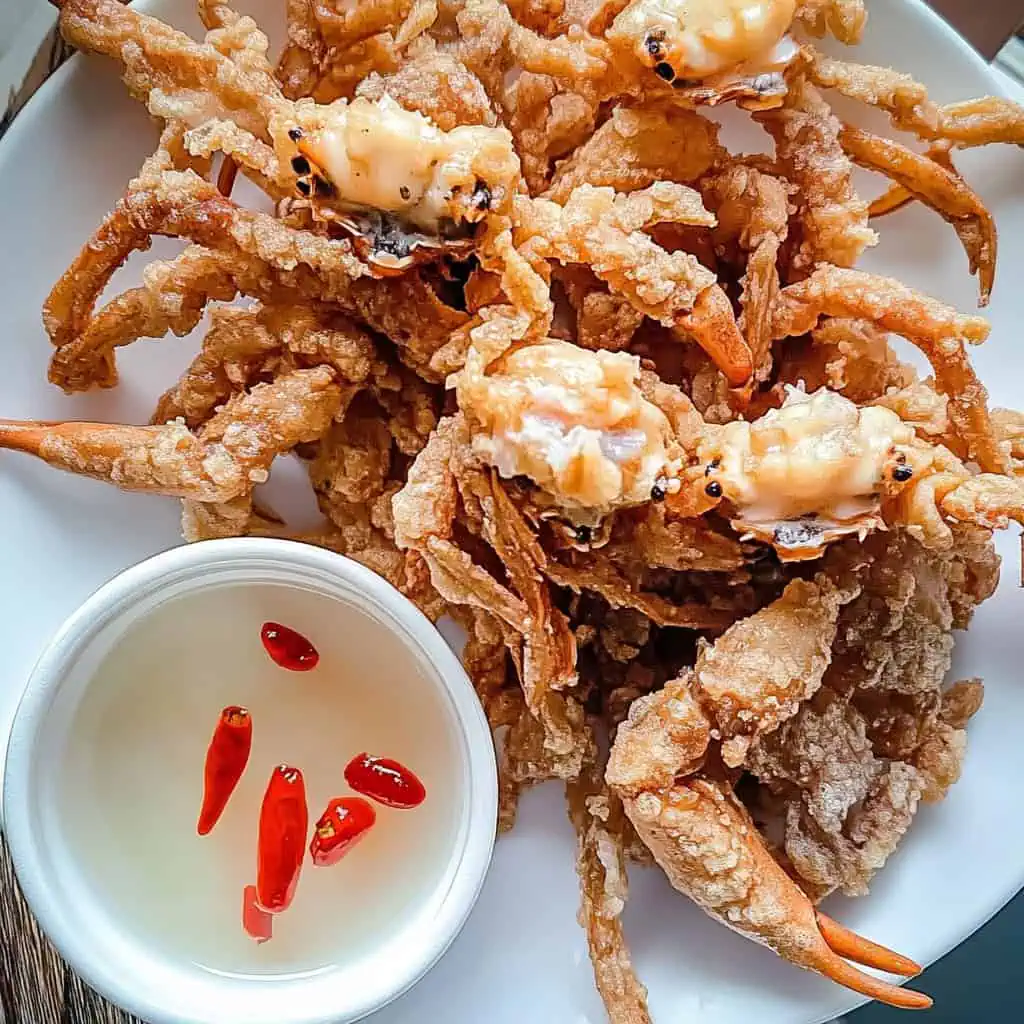
Why You'll Love This Recipe
- Incredibly crispy texture that stays crunchy for hours
- Perfect balance of seafood flavor and spices
- Simple ingredients you can find in any Asian market
- Great as pulutan (beer snacks) or appetizer
- Ready in less than 30 minutes
- Authentic Filipino street food experience at home
Ingredients
The ingredients in this recipe are carefully selected to create the ultimate crispy crablet experience. Fresh crablets form the star of the dish, providing natural sweetness and delicate seafood flavor. The double-coating system of seasoned flour creates that signature crunch, while paprika and cayenne add warm, complex heat without overwhelming the delicate crab.
The egg-milk mixture acts as the essential binding agent that helps the coating adhere perfectly. For the dipping sauce, vinegar provides tang, sugar balances acidity, and fresh aromatics like garlic, cilantro and cucumber add brightness and depth.
Each ingredient plays a specific role in achieving the perfect balance of textures and flavors that makes this dish so irresistibly addictive.
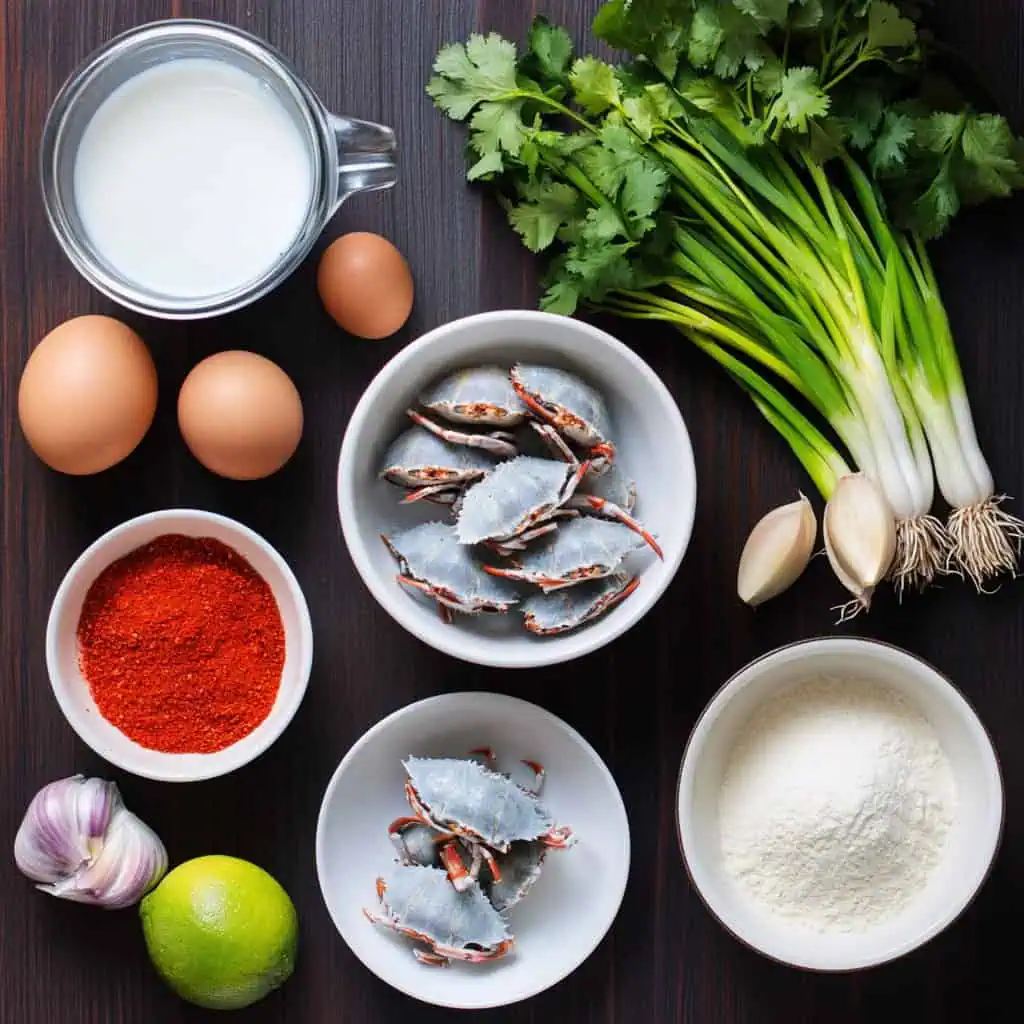
For the Crablets:
- 400g crablets, cleaned and patted dry
- 1 egg
- ½ cup milk
- 1 cup all-purpose flour
- ½ tablespoon paprika powder
- ½ tablespoon cayenne pepper
- Salt and pepper to taste
- 4 cups cooking oil for frying
- Spring onions for garnish
For the Spiced Vinegar Dip:
- 1 cup distilled white vinegar
- 1 lime, juiced
- 6 tablespoons superfine sugar
- 2 teaspoons chili paste (sambal)
- 2 cloves garlic, minced
- 1 tablespoon fresh cilantro, chopped
- 1 tablespoon spring onion, chopped
- 3 tablespoons cucumber, diced
Equipment
- Deep fryer or large, deep pot - For maintaining consistent oil temperature during frying
- Deep-fry thermometer - Essential for precise temperature control to achieve perfect crispiness
- Spider strainer or slotted spoon - For safely removing crablets from hot oil without damaging them
- Paper towels - For draining excess oil and ensuring maximum crispiness
- 3 medium mixing bowls - To set up an efficient dredging station
- Whisk - For thoroughly combining the egg and milk mixture
- Small saucepan - For preparing the vinegar dipping sauce
- Cutting board and knife - For preparing garnishes and dipping sauce ingredients
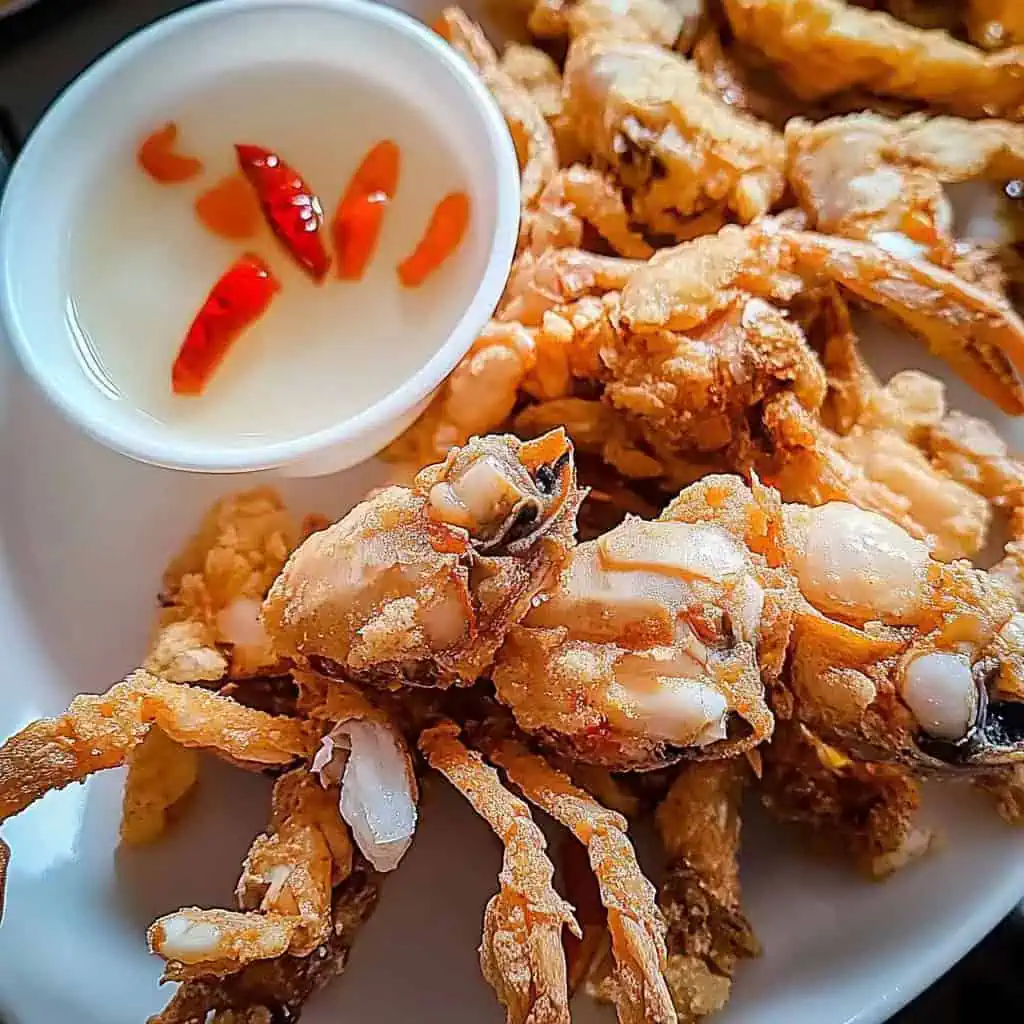
How To Make
- Start by making your dipping sauce. Heat vinegar, sugar, and chili paste in a small pan over medium heat (175°C/350°F). Stir until sugar completely dissolves. Remove from heat and let it cool. Once cooled, mix in minced garlic, chopped cilantro, spring onions, lime juice, and diced cucumber. Set aside.
- Clean your crablets well under running water. Pat them completely dry with paper towels - this is very important for crispiness. Season lightly with salt and pepper.
- Set up three bowls. In the first bowl, mix flour with paprika, cayenne, salt, and pepper. In the second bowl, beat egg and milk together. Put some of the seasoned flour in the third bowl.
- Heat your oil in a deep pot or fryer to 185°C (365°F). Use a thermometer if you have one - the right temperature makes them extra crispy.
- Working with a few crablets at a time, coat them in the first bowl of flour. Shake off extra. Dip in egg mixture, let excess drip off. Finally, coat in the last bowl of flour.
- Carefully put the coated crablets in the hot oil. Don't overcrowd - leave space between them. Fry for 1-2 minutes on each side until golden brown. Keep oil temperature between 180-185°C (355-365°F).
- Take them out with a slotted spoon and place on paper towels to drain. Sprinkle with chopped spring onions while hot.
- Serve right away with your dipping sauce. They're best enjoyed hot and crispy.

Tips from Lola's Kitchen
- Choose the smallest crablets possible - The smaller they are, the crispier they'll get throughout
- Double-coating is non-negotiable - This technique creates that signature crackly exterior that makes this dish special
- Ensure crablets are bone-dry before coating - Any moisture will cause oil splatter and prevent proper crisping
- Maintain oil temperature consistently - Too hot, they'll burn; too cool, they'll absorb oil and become soggy
- Season the flour generously - Crablets need adequate seasoning to shine through the coating
- Let the dipping sauce rest - Making it first allows the flavors to meld while you prepare the crablets
- Serve immediately - These are at their absolute best when freshly fried and still crackling
Substitutions
- Crablets: Small shrimp, krill, or even tiny squid can work with adjusted cooking times
- Fresh lime: Calamansi or lemon provides a similar bright acidity
- Cayenne: Regular chili powder, Korean gochugaru, or even paprika for milder heat
- Cilantro: Fresh parsley or additional green onions if you're not a cilantro fan
- Chili paste: Finely chopped fresh chilies, hot sauce, or even a pinch of chili flakes
- Milk: Buttermilk for extra tang or water if that's all you have on hand
Troubleshooting
- Not crispy enough? Ensure oil is hot enough (180-185°C) and crablets are completely dry before coating. Try a thinner layer of crablets when frying.
- Too oily or greasy? Oil temperature was likely too low. Use a thermometer and maintain proper temperature. Also, change paper towels between batches.
- Coating falling off during frying? Ensure proper drying of crablets and press coating firmly. Let coated crablets rest for 5 minutes before frying.
- Too salty or over-seasoned? Adjust seasoning in the flour mixture, not directly on crablets. Balance with less seasoned dipping sauce.
- Burning too quickly? Oil temperature too high. Reduce heat and monitor with thermometer.
Storage & Reheating
- Refrigeration: Store in an airtight container in the refrigerator for up to 2 days. Separate layers with parchment paper to prevent sticking.
- Reheating: For best results, place on a wire rack in a preheated oven at 180°C (350°F) for 5-7 minutes. Avoid microwave reheating as it makes them soggy.
- Freezing: Not recommended as texture significantly deteriorates upon thawing.
- Dipping sauce: Can be stored separately in the refrigerator for up to 1 week in an airtight container.
- Best practice: These are truly at their peak when consumed within 30 minutes of cooking.
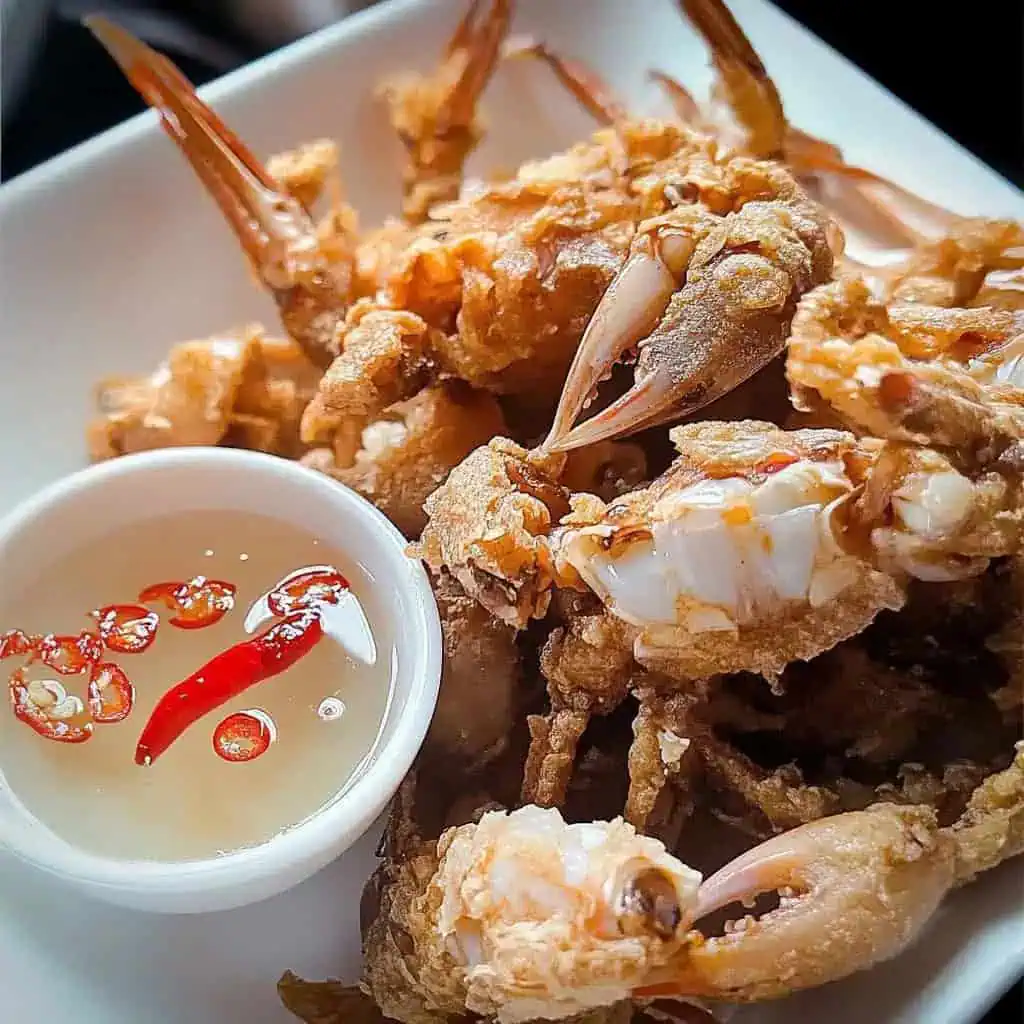
FAQ
Where can I buy crablets?
Check Asian markets, specialty seafood shops, or Filipino grocery stores. You can also inquire at local fish markets or contact Filipino food suppliers online.
Can I prepare these in advance for a party?
You can prepare the dipping sauce and set up the dredging station in advance, but for optimal crispiness, the crablets should be coated and fried just before serving.
How do I know if crablets are fresh?
They should have a fresh, clean sea smell (not fishy), appear moist but not slimy, and ideally still show some movement if very fresh.
Can I air fry these instead of deep frying?
Yes, though the texture will be different. Preheat air fryer to 200°C (400°F), lightly spray coated crablets with oil, and cook for 8-10 minutes, turning halfway.
Are these eaten whole with the shell?
Yes! The crablets are small enough that the entire crab, shell and all, becomes deliciously crispy and edible.
Can I reduce the spice level for children?
Absolutely. Omit the cayenne in the coating and reduce or eliminate the chili paste in the dipping sauce.
What's the ideal size for crablets to use in this recipe?
Look for crablets that are about 1-2 inches in diameter. Anything larger may not cook through properly and smaller ones might overcook too quickly.
What drinks pair well with this dish?
Traditionally, these are served with cold beer. Non-alcoholic options include calamansi juice, iced tea, or coconut water.
Related
Looking for other recipes like this? Try these:
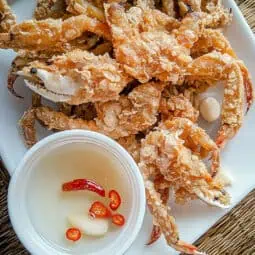
Crispy Crablets (Pritong Maliliit na Alimango) Recipe
Equipment
- Deep fryer or large, deep pot (for maintaining consistent oil temperature)
- Deep-fry thermometer (for precise temperature control)
- Spider strainer or slotted spoon (for safely removing crablets)
- Paper towels (for draining excess oil)
- 3 medium mixing bowls (for dredging station)
- Whisk (for beating eggs and milk)
- Small saucepan (for vinegar dip)
- Cutting board and knife (for preparing garnishes)
Ingredients
For the Crablets:
- 400 g crablets maliliit na alimango, cleaned and patted dry
- 1 egg itlog
- ½ cup milk gatas
- 1 cup all-purpose flour arina
- ½ tablespoon paprika powder pulbos na paprika
- ½ tablespoon cayenne pepper siling pulbos
- Salt asin and pepper (paminta) to taste
- 4 cups cooking oil for frying mantika
- Spring onions dahon ng sibuyas for garnish
For the Spiced Vinegar Dip (Sawsawang Suka):
- 1 cup distilled white vinegar suka
- 1 lime dayap, juiced
- 6 tablespoon superfine sugar asukal
- 2 teaspoon chili paste sambal or siling dinurog
- 2 cloves garlic bawang, minced
- 1 tablespoon fresh cilantro wansuy, chopped
- 1 tablespoon spring onion dahon ng sibuyas, chopped
- 3 tablespoon cucumber pipino, diced
Instructions
- Start by making your dipping sauce. Heat vinegar, sugar, and chili paste in a small pan over medium heat (175°C/350°F). Stir until sugar completely dissolves. Remove from heat and let it cool. Once cooled, mix in minced garlic, chopped cilantro, spring onions, lime juice, and diced cucumber. Set aside.
- Clean your crablets well under running water. Pat them completely dry with paper towels - this is very important for crispiness. Season lightly with salt and pepper.
- Set up three bowls. In the first bowl, mix flour with paprika, cayenne, salt, and pepper. In the second bowl, beat egg and milk together. Put some of the seasoned flour in the third bowl.
- Heat your oil in a deep pot or fryer to 185°C (365°F). Use a thermometer if you have one - the right temperature makes them extra crispy.
- Working with a few crablets at a time, coat them in the first bowl of flour. Shake off extra. Dip in egg mixture, let excess drip off. Finally, coat in the last bowl of flour.
- Carefully put the coated crablets in the hot oil. Don't overcrowd - leave space between them. Fry for 1-2 minutes on each side until golden brown. Keep oil temperature between 180-185°C (355-365°F).
- Take them out with a slotted spoon and place on paper towels to drain. Sprinkle with chopped spring onions while hot.
- Serve right away with your dipping sauce. They're best enjoyed hot and crispy. Makes enough for 4-6 people to share.
Tips from Lola's Kitchen
- Choose fresh, small crablets - bigger ones won't get as crispy
- Double-coating ensures maximum crunchiness
- Pat crablets very dry before coating for best results
- Don't overcrowd the fryer - fry in small batches
- Season the flour mixture generously - crablets need good seasoning
- Fresh oil produces crispier results
Nutrition
The Story Behind Filipino Crispy Crablets
The story of Pritong Maliliit na Alimango, or Filipino Crispy Crablets, is deeply woven into the fabric of Philippine coastal living, where the abundance of seafood meets culinary ingenuity. This beloved dish originated in the fishing communities that dot the Philippine archipelago, where local fishermen would bring in their catch of tiny crabs along with their larger seafood harvest. Rather than discard these small crustaceans, resourceful Filipino home cooks discovered that when properly cleaned, seasoned, and fried until golden brown, these little crabs transformed into an irresistibly crunchy delicacy.
In coastal provinces like Bataan, Zambales, and Pangasinan, crispy crablets quickly became a staple pulutan (beer accompaniment) in local watering holes and casual eateries. The dish gained popularity for its perfect combination of seafood sweetness and crispy texture, making it an ideal partner for ice-cold beer and animated conversations. What started as a practical way to utilize smaller catches soon became a sought-after delicacy that represented the ingenuity of Filipino cooking.
Today, these crispy crustaceans have evolved from their humble beginnings as street food to becoming a celebrated appetizer in Filipino restaurants worldwide. The preparation method has been refined over generations, with each family adding their own twist to the basic recipe. Some coastal regions serve them with spiced vinegar, while others prefer a more complex sawsawan (dipping sauce) featuring chilies, garlic, and citrus. The dish particularly shines during festive occasions and family gatherings, where platters of these golden-brown morsels disappear almost as quickly as they're served.
Modern Filipino cuisine continues to embrace this traditional dish, with chefs putting contemporary spins on the classic recipe while maintaining its essential character. Whether enjoyed as street food in coastal markets, as a premium bar snack in urban establishments, or prepared at home for special occasions, crispy crablets remain a testament to the Philippine culinary tradition of transforming simple ingredients into extraordinary dishes through skillful preparation and deep understanding of flavors.
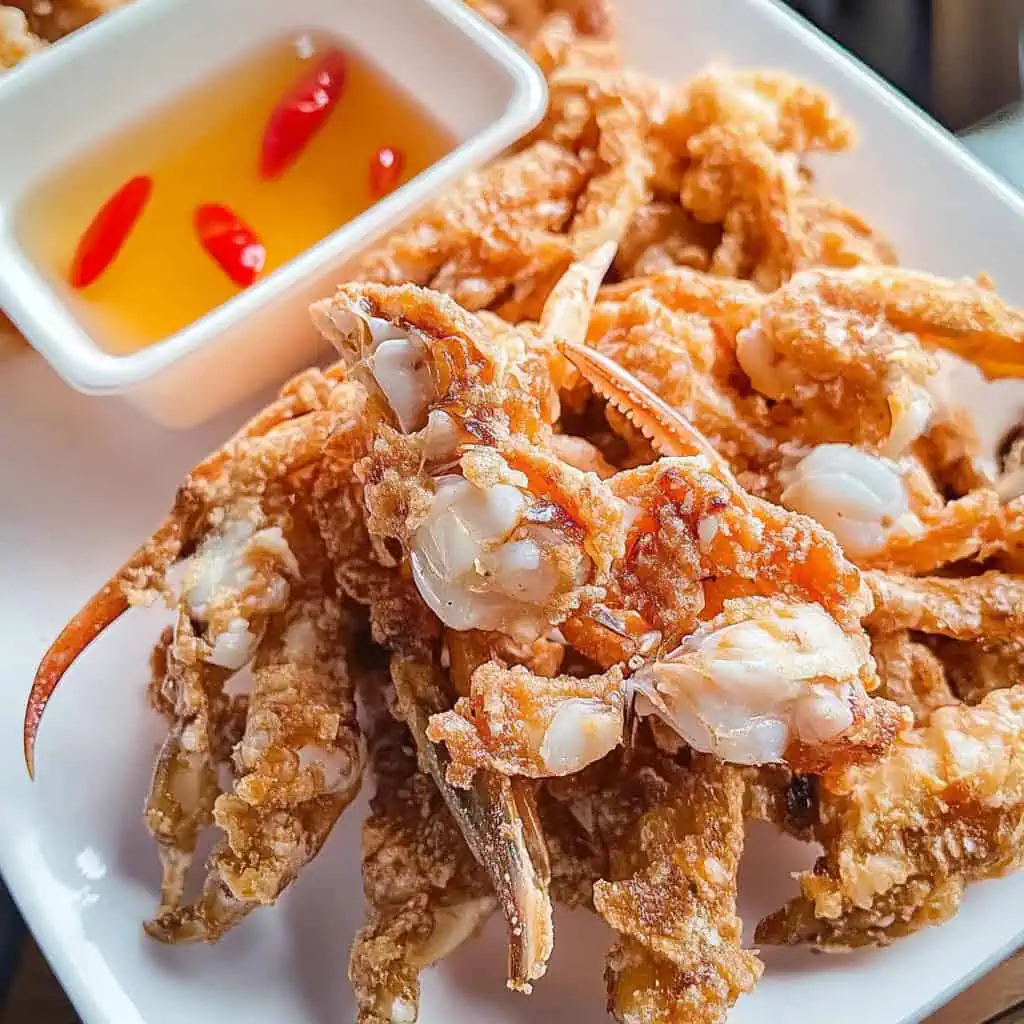

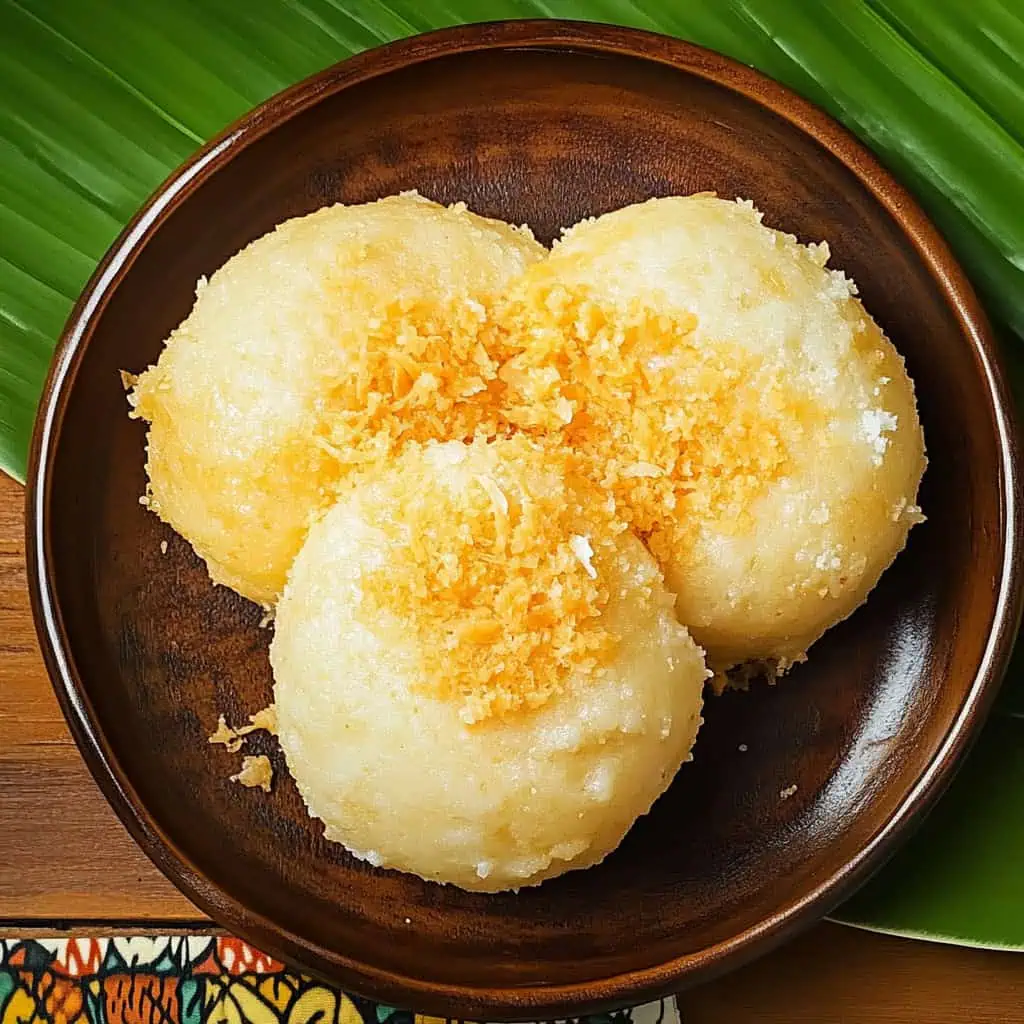
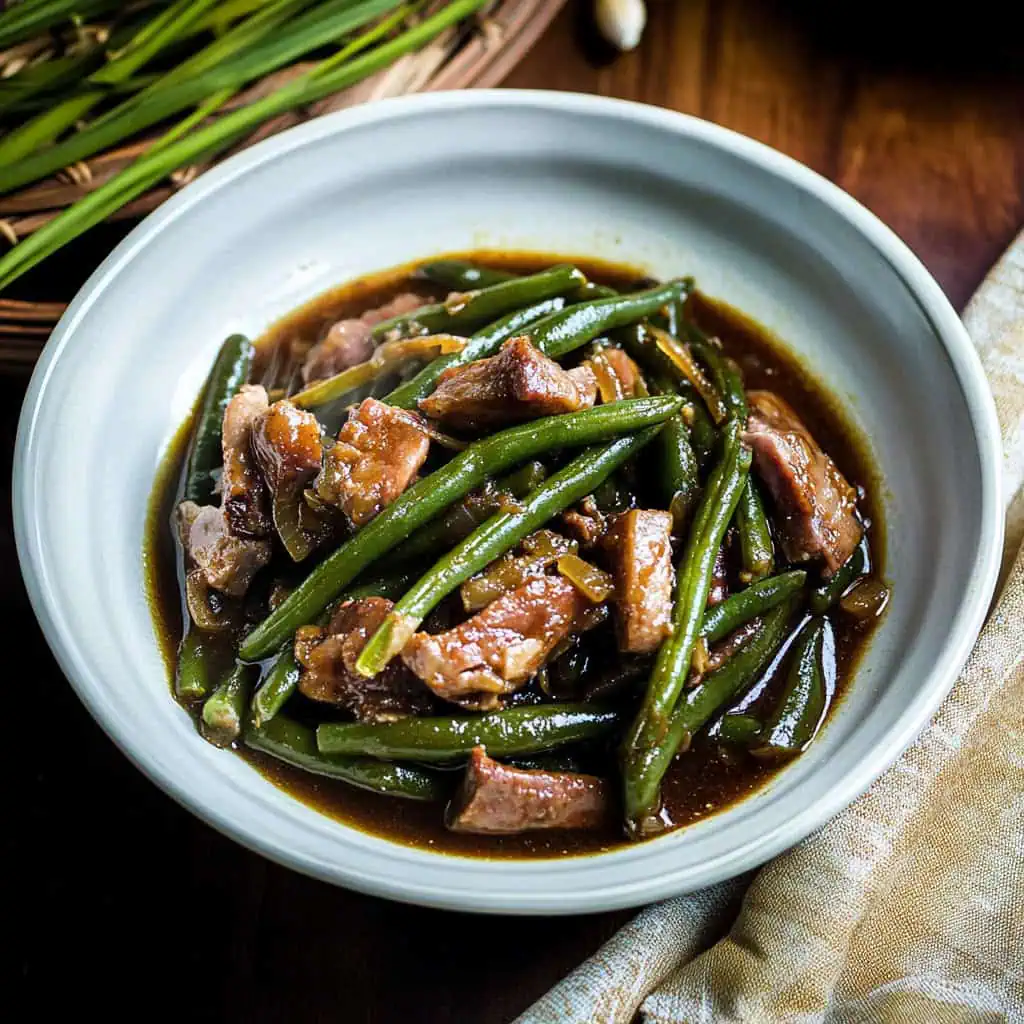

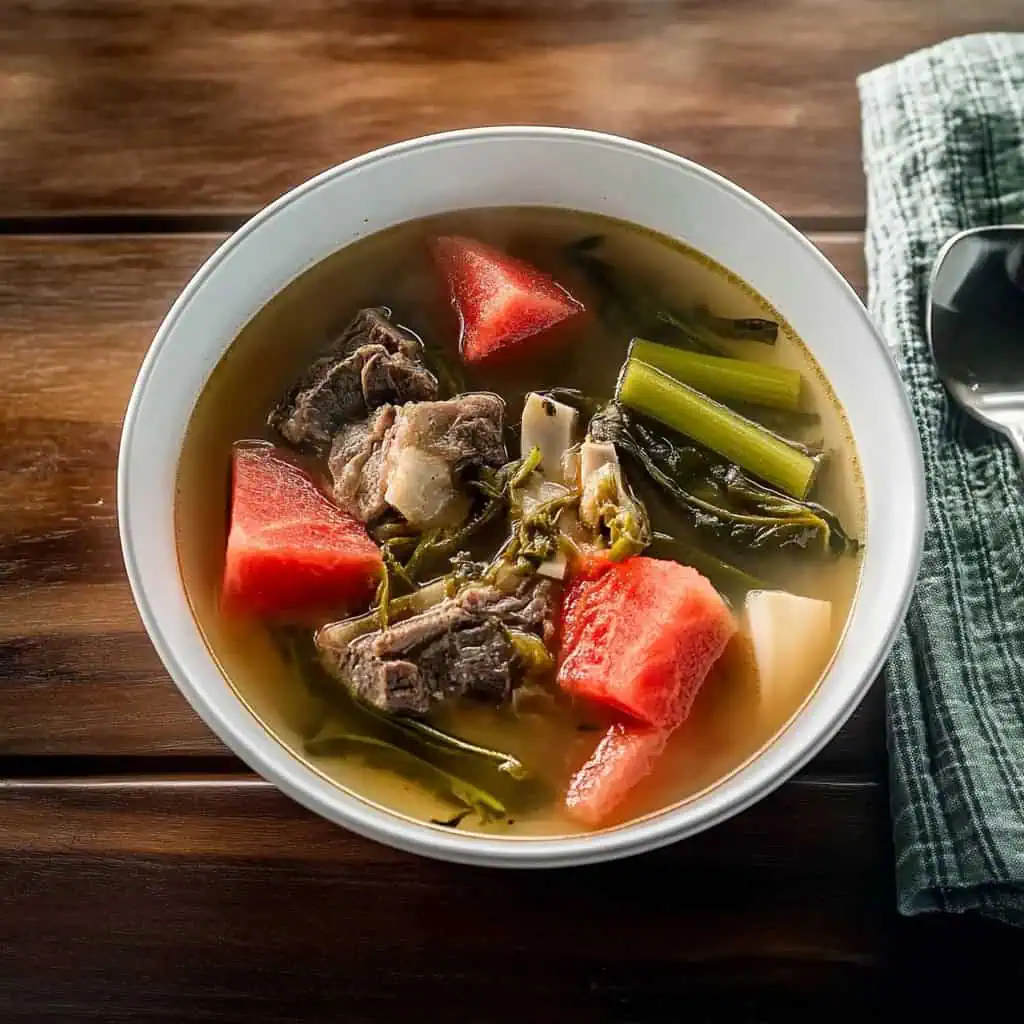

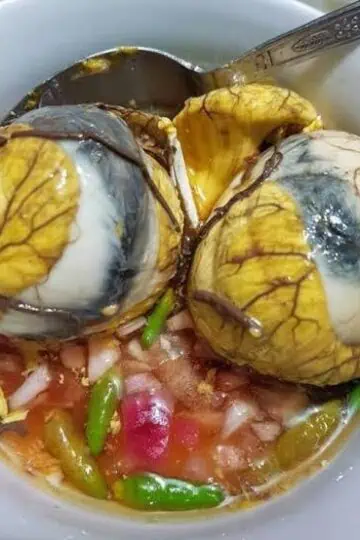


Comments
No Comments